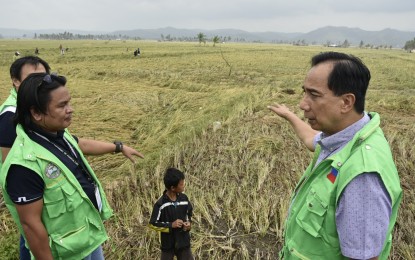
MANILA – Farmer beneficiaries of the collective Certificate of Land Ownership Award (CLOA) under the Comprehensive Agrarian Reform Program (CARP) will soon receive their individual land titles through a Department of Agrarian Reform (DAR) project which supports parcelization of lands.
“Ngayon pag meron na tayong parcelization o itong SPLIT program magkakaron na ng katunayan yung kanilang matagal ng hinahangad, meron na silang titulo sa kanilang sariling lupa at sila ay magiging totoong mga nagmamay-ari na ng lupa (Now when the project SPLIT starts to be implemented, the farmers will finally have what they have been dreaming of, they will have their own land title and will be true land owners),” DAR Secretary John Castriciones said during the project’s virtual launch on Thursday.
Project Split (Support to Parcelization of Lands for Individual Titling) aims to subdivide a total area of 1,368,883 hectares of land that are under the collective CLOA, Castriciones said.
The project is expected to benefit some 1,140,735 agrarian reform beneficiaries (ARBs) all over the country who will soon receive their individual land titles awarded under CARP.
“Today we are going to implement a program that is so noble that it will be able to address the concerns of all our small farmers who we all know are the ones who have long suffered and endured the difficulties in life because of the problems in reference to their lack of resources in order to uplift their economic lives,” Castriciones said.
The project is funded by World Bank with a total project cost of PHP24.625 billion comprising 78-percent loan proceeds amounting to PHP19.240 billion and a 22-percent counterpart from the Philippine government amounting to PHP5.385 billion.
Castriciones added that the project seeks to improve land tenure security and stabilize property rights of the targeted ARBs to be implemented in 78 provinces in 15 regions in the country.
Through Project Split, Castriciones said issues and concerns faced by farmer beneficiaries of collective CLOAs as well as banking institutions and local government units will now be addressed.
He said collective CLOAs do not specifically identify the area or portions of land owned by a specific farmer.
This issue then leads to unpaid amortizations because the farmer is unable to specify which portion of land they own, and unpaid real property taxes to the LGU.
But the main problem, Castriciones said, is the difficulty farmers have in accessing assistance and loans.
“Because of the lack of title to our farmers, what happens is that they are unable to enter into loans or financial institutions or they are deprived of the assistance that are to be extended by the public and private institutions that would like to help and assist our farmers,” Castriciones said.
He added that this defeats the very essence of CARP.
Castriciones said overall, DAR has distributed about 4.8 million hectares of land nationwide since the inception of CARP.